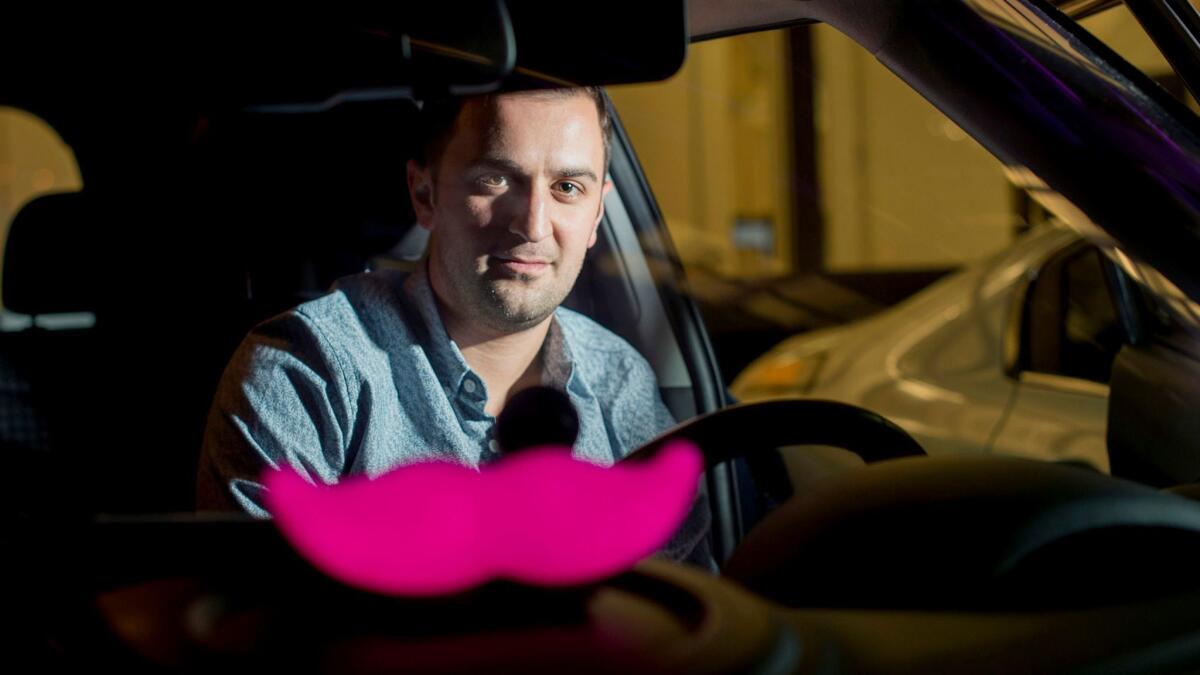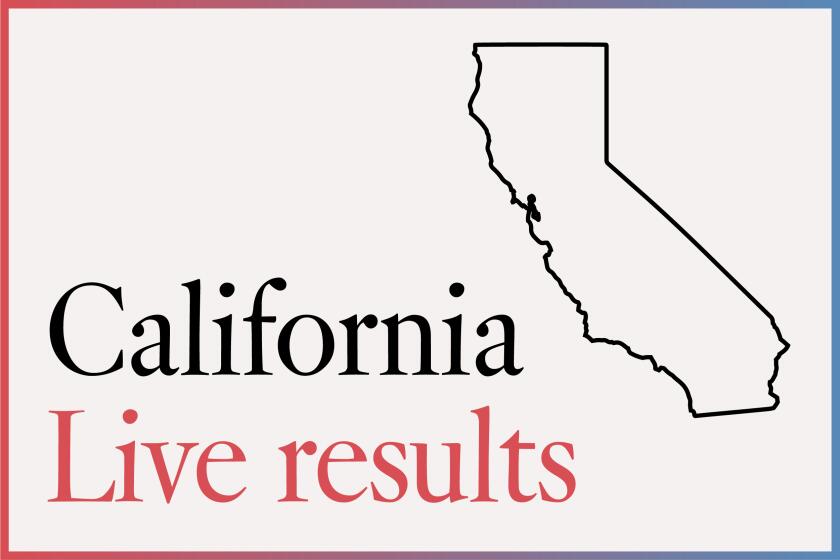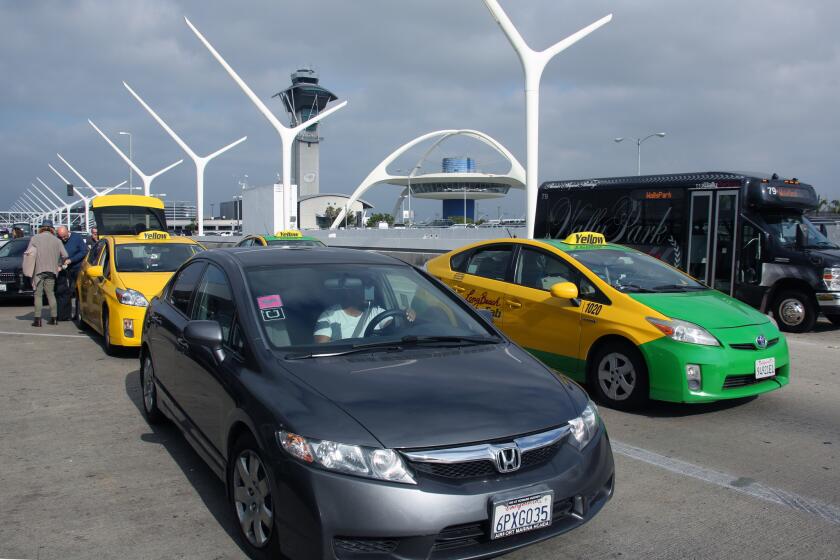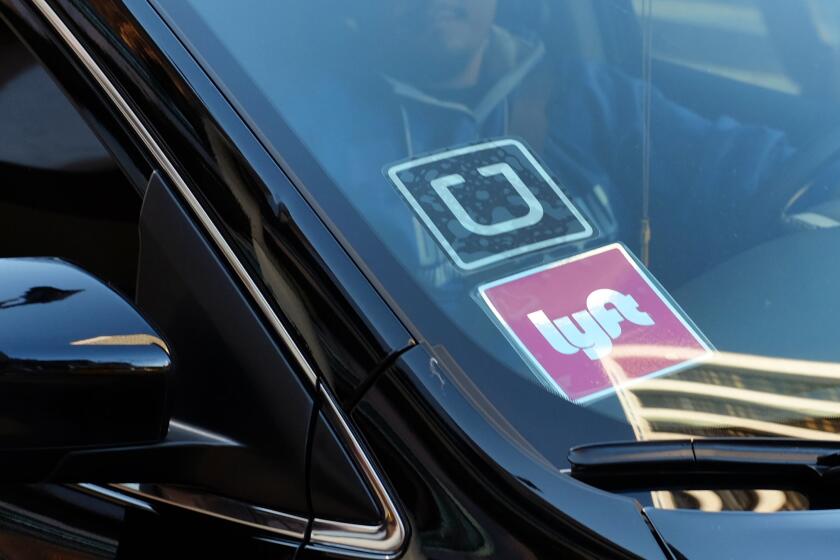After winning Prop. 22, Lyft president says he still wants a deal with unions

- Share via
SACRAMENTO — Lyft President John Zimmer is extending an olive branch to his labor foes.
After the company he co-founded notched a decisive victory on Proposition 22 in Tuesday’s election, he said he’s ready and willing to return to the California Capitol and work out a deal that allows the unions that opposed his campaign to represent workers in the industry.
“We’re ready to work with labor leaders and all interested parties who want to move forward and build a stronger safety net,” Zimmer said in an interview with The Times. “If there’s a way we can work more together, which to me seems totally attainable and seems better, then we should pursue that.”
Zimmer’s desire for peace may seem unusual after his company joined Uber, DoorDash, Instacart and Postmates in spending an unprecedented $200 million to win the ballot fight and keep ride-hail and delivery drivers classified as independent contractors, a major triumph for business and turning point in the conversation about the future of work. Lyft’s offer to negotiate also came just hours after labor threatened to expand its fight against ride-hail and delivery companies, a reminder of the gulf between labor and business on how to treat a workplace behind the wheel.
Zimmer has two potential paths forward after Election Day. He and his allies can use the momentum of their election win to end the feud with unions and strike a deal on a framework for an independent workforce with union representation that can be replicated in other states or at the federal level. Or they can continue an expensive and bitter battle with labor in California and in statehouses and on ballots around the country.
Some in labor were skeptical about a deal and view the latter path as more likely unless a compromise between labor and the app-based companies is brokered in another state.
But Rome Aloise, vice president-Western Region for the International Brotherhood of Teamsters and president of Teamsters Joint Council 7 in California, said the union could be open to continuing conversations.
“If you don’t have a discussion, you can never resolve an issue,” Aloise said.
Labor and rideshare and delivery companies have been fighting in California over worker classification for several years. Unions helped pass Assembly Bill 5 in 2019 to require more companies to treat their workers as employees and provide benefits and job protections.
Gov. Gavin Newsom urged a compromise to grant Uber and Lyft an exemption to the state law. When those talks between the app-based companies and unions halted, the companies responded with Proposition 22.
Closely watched across the country, the passage of the measure sent a signal to corporations, proving they had a new way to write their own employment classifications and avoid paying a full suite of worker benefits — even in a deep-blue state that is a labor stronghold.
California voters approve Prop. 22, allowing Uber and Lyft drivers to remain independent contractors
Proposition 22 creates special employment rules for California app-based companies, allowing drivers to remain independent contractors.
“People wanted to see where voters stood and this helps clarify that,” Zimmer said of Proposition 22’s approval.
Parties on all sides say a deal could allow for some form of sectoral collective bargaining and the creation of employer-funded portable benefits for industry workers. Zimmer said voters settled the debate about treating app-based workers as independent contractors.
Whether the different factions of organized labor at the California Capitol share a willingness to negotiate, or can agree to what exactly a deal would entail, remains unclear.
Labor conceded on Tuesday night before Uber and Lyft were officially declared the winners of the Proposition 22 ballot measure contest with 58% of the vote. But the statement from the California Labor Federation read more like a declaration of war than an opening for new conversations.
“The obscene amount of money these multi-billion dollar corporations spent misleading the public doesn’t absolve them of their duty to pay drivers a living wage, provide PPE to protect workers as the pandemic deepens or repay taxpayers for the nearly half a billion these companies have cheated from our state unemployment fund,” said Art Pulaski, the executive secretary treasurer of the California Labor Federation. “The end of this campaign is only the beginning in the fight to ensure gig workers are provided fair wages, sick pay and care when they’re hurt at work.”
Among concerns that stalled earlier negotiations, unions worried that any special employment rules created for Uber and Lyft could open the door for other companies to stop classifying their workers as employees if they don’t want to pay traditional benefits. Some questioned sectoral bargaining, an untested form of representation in California.
With the passage of Proposition 22, ride-hailing drivers and delivery workers could access to some new benefits as early as December.
Tuesday’s election results dealt a blow to organized labor and gave app-based companies the upper hand, but the measure also created new roadblocks.
Some in labor argue that the language Uber and Lyft included in Proposition 22, requiring a seven-eighths vote of the Legislature to make future amendments, all but nixes any hope of legislators settling the dispute. Labor unions are also considering lawsuits to challenge that provision of the measure in court.
Although both legislative houses maintained their Democratic supermajority on Tuesday, with Senate President Pro Tem Toni Atkins picking up at least one seat and Assembly Speaker Anthony Rendon losing one, reaching the seven-eighths threshold to change the measure would be politically difficult and require support from several Republicans.
Representatives for Uber declined to comment on the possibility of a deal. When asked what it would take to bring unions and the industry together again, Zimmer pointed to Newsom. The situation could give the governor another opportunity to forge a deal after his previous attempts failed.
Wedged between labor unions and tech companies, the governor remained neutral on Proposition 22. Days before the election, he said his neutrality afforded him the benefit of being in a better position to broker a compromise “if there is a need, a desire.”
“We need political leaders and third parties to pull us together,” Zimmer said. “I’ve tried. I’ve listened and I will continue to do so. And I think if there are parties, like the governor ... they have a willing and ready partner in Lyft and myself.”
More to Read
Sign up for Essential California
The most important California stories and recommendations in your inbox every morning.
You may occasionally receive promotional content from the Los Angeles Times.














